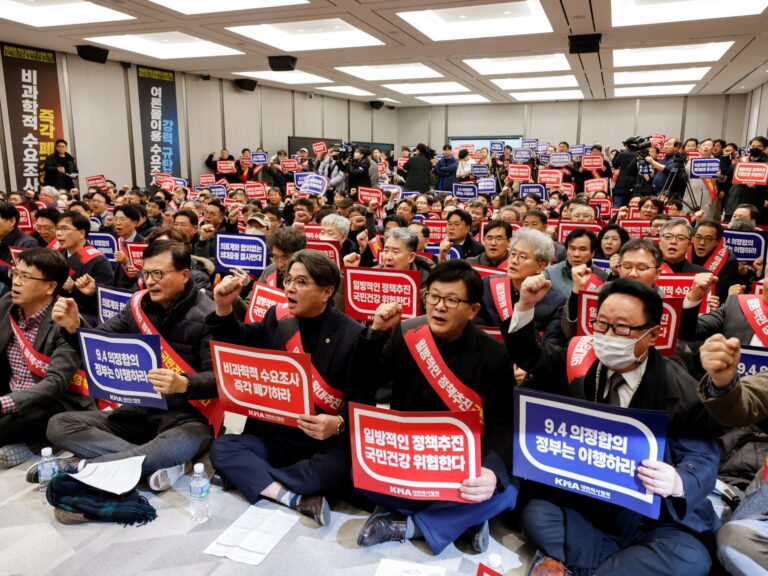Of the approximately 9,000 doctors who went on a large-scale strike over government reforms, only 294 have returned to work at hospitals.
Thousands of South Korean trainee doctors who went on a large-scale strike over medical reform are refusing to return to work, defying the government's deadline to end the strike or face legal action.
Yonhap News reported on Thursday, the day of the deadline, that there is “little sign” that most of the young doctors protesting the government's push to expand admissions to medical schools will return to hospitals.
As of Wednesday night, only 294 of the more than 9,000 trainee doctors who left their jobs have returned to work, Vice Health Minister Park Min-soo said at a press conference.
“We're fortunate to have some residents who have come back to work with patients, and I think they made a wise decision,” he said.
President Park said she has contacted doctors involved in the strike for consultation and hopes to meet later Thursday, adding that it is unclear “how many will participate.”
“We said if they come back by today, we will not be responsible for them leaving the workplace,” he said. “Doctors exist to serve patients, and patients are anxiously waiting for you. This is no way to protest the government.”
The Korean Medical Association (KMA) has criticized the government's “intimidation tactics” and has not commented on the possibility of talks. But a social media account run by young doctors shared a screenshot of a text message from the government, writing: “You must be kidding.”
Since Friday is a public holiday, the government is expected to begin formal measures to punish them on Monday.
Kim Chun-hwan, a senior health ministry official, said that starting March 4, the government will notify doctors who have missed the deadline of the plan to suspend their licenses and give them an opportunity to respond.
Under South Korean law, the government can order doctors to return to work if it determines there is a serious risk to public health. Failure to comply with such an order could result in a medical license being suspended for up to one year, imprisonment for up to three years, or a fine of 30 million won (approximately $22,500).
Those sentenced to prison will have their medical licenses revoked.
Some officials said authorities would likely punish only the strike leaders to avoid further strain on hospital operations.
At the heart of the controversy is the government's plan to increase the number of applicants to medical schools by 2,000 from next year, a 65 per cent increase from the current 3,058.
The government has said it aims to add up to 10,000 new doctors by 2035 to tackle the rapidly aging population. Officials say South Korea has one of the lowest ratios of doctors to population among developed countries.
The young doctors protesting say universities are not prepared to provide quality education to so many new students, and that the government must first reduce salaries and labor before trying to increase the number of doctors. He argues that conditions should be addressed.
But their critics argue that the striking doctors are simply worried about an expected drop in income due to the sharp increase in the number of their fellow doctors.
The strike has caused chaos at major hospitals, forcing them to refuse admission to some patients and cancel surgeries and medical procedures.
A coalition of groups representing patients suffering from serious illnesses such as cancer and Lou Gehrig's disease has called on doctors to return to work so they can discuss ways to improve the health care system for everyone.
Lee Geun-joo, who is in hospice care due to terminal lung cancer, appealed to doctors, saying that he was greatly helped by high-quality medical care and well-trained doctors during his 25 years of lung cancer treatment.
“Before considering any conditions for any reason, your place is next to the patient,” Dr. Lee said in a statement, adding that doctors have sworn an oath to “put the health and well-being of our patients first.” It reminded me of. .
Opinion polls show that the government's plan is widely supported by South Koreans. President Yoon Seok-yeol, who has taken a tough stance against striking doctors, has also seen an increase in his approval ratings.
Analysts say the government's tough stance could work to its advantage ahead of parliamentary elections scheduled for April 10.
“If the government withdraws now, it will realize that it is a big setback for the upcoming general election,” Kim Jae-hong, executive director of an NGO that advocates for free healthcare, told AFP news agency.
But doctors said: “We believe that we would be doing ourselves a disservice if we retreated at this point. The current stalemate is likely to continue for some time.”


